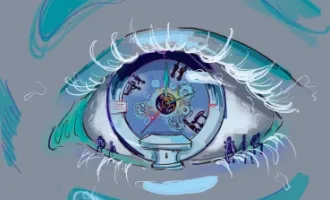Trio for the Ages
This is Victor Lam's second place winning entry to the Synapse Storytelling Contest's creative writing category.
We walked a few blocks from where we parked across a busy Van Ness littered with construction fences and orange cones. The river of traffic stopped temporarily to let us pass as cars waited anxiously to continue their journey in the city’s asphalt streams. Our cellist wheeled his cello case behind him as he dodged the various bumps, cracks, and potholes we encountered on our journey. I carried both my clarinets in a case on my back along with everything I needed for the performance. Our pianist followed with nearly empty hands and only carried the tablet he used for sheet music.
Our instruments were safe in our cases as we faced an occasional gust of cool wind. The atmosphere oscillated every few minutes between a sunlit day piercing the monochrome buildings surrounding us to grey skies dominated by low fog. Nonetheless, we made it to our performance venue for the day. The retirement home had no defining features from far away. It might have been slightly taller than some of the surrounding buildings, but it looked no different from the hotels or larger apartment complexes nearby.
After locating the entrance, we checked in with reception in a cramped quarantine-like area between two sets of sliding glass doors. We were soon allowed inside with our instruments and music in tow. We walked slowly in awe of the spacious and well decorated interior. The lobby was hotel-like with polished floors reflecting the image of our movements from below. In the center was a white marble statue, too perfectly intact and white to be a museum piece, in the center of a black slate pool trapping its movement.
The room we performed in had a mellower décor. A deep mahogany wood covered the walls and support pillars. The chairs and tables matched accordingly. Despite the strong sunbeams piercing the windows, the room maintained a calm and dim presence. Only the two pianos, with its reflective darkness, stood out of place in the back of the room. Our pianist headed straight for them to see which instrument he would use, carefully paying attention to pitch and timbre as he tapped away at the keys.
Other chamber music groups from UCSF started to show up to set up and warm up while the snow-haired residents of the home peeked in occasionally out of curiosity. As the other groups tested the pianos and their violins, I reflected a bit on how I ended up doing chamber music in the first place.
I was wrapping up my first year in San Francisco, and I was still trying to find a community in the city. I took clarinet lessons in college, but classes with my last teacher ended up discouraging me from actively playing music. Practicing became tedious since I was assigned music rather than choosing pieces I wanted to explore. The richness of music and emotions it can convey disappeared from me for a while. After moving, I hoped to regain the passion that I lost. I stumbled upon a group of classical musicians at UCSF. Even though we were all from different programs, schools, and career paths, we all found a common bond through music.
The sounds of instruments slowly faded away as the audience trickled in and filled the random assortment of padded chairs and couches dispersed throughout the room. I placed my music on the stand, confirmed that it was the Brahms Clarinet Trio, and then I waited for the pianist to play the tuning note. The cellist and I tested a few different notes and octaves as the piano repeated the tuning note several times. A few seconds of silence followed before the cellist signaled the start of the piece with his bow in a ready position.
The trio started with a dark and somber cello solo. The clarinet repeated and elaborated the melody in a lighter and more tearful voice with a gentle piano accompaniment. The piece took a darker turn, in contrast to the bright room, when the pianist broke into a turbulent dance on the keys. The cellist and I restored order through a peaceful melody hiding melancholy.
Nonetheless, the piece calls for us to fall into an intensity the piano foreshadowed earlier. Entering with ascending runs, the cellist and I both fought to be dominant in this section. Despite having only three actors in this trio, we worked hard to achieve the story and emotional depth the piece demanded. Each instrument and line had its own story shifting from sad to sweet to intense at Brahms’s whim.
After a frantic fight, we all entered a calm and sweet section more fitting for the venue. Despite Brahms’s gruff appearance and unlikeable personality, he manages to fit in sentimental and dessert-like sections in some pieces. A quiet dance between the cello and clarinet lines followed, trading off gliding lines of ascending and descending notes. These moments faded quickly the tone shifted back to a pensive sadness, and we repeated motifs and melodies from earlier in the piece.
We emerged from the sadness permanently with an aria-like melody played on the clarinet. This sequence of notes expressed pure joy, so I played it with as much energy and care as I could. Although the ending section at first contained shadows of darkness found throughout the piece, it quickly subsided into a soft reconciliatory section. The cello and clarinet chased each other with quick runs of notes before playing in unison to finish the piece. Despite the speediness of our fingers, the sound of our music brought the room back to a tranquil setting. We held out the final chord, and I finally waved my clarinet to signal the final release of the music and the last of Brahms’s thoughts we would play today. No, this was not his performance and only his musicality but ours as well. The beauty of classical music comes from the range of emotions that can be expressed and the unique methods of expressing these thoughts.
After a brief silence, we stood and took a bow. We complimented each other on our hard work and impressive performance before taking our seats as some of the younger members of the audience. With the brief break between performances, I stared pensively into the courtyard outside the room. The plants appeared to thrive despite the constant change in weather the past few days. Even though I wasn’t afraid going into the performance, I felt a sense of relief afterwards. After not being fully connected with music for over a year, I regained my excitement and passion for music. I turned my head back to the front just in time for the violinist to nod to the pianist to signal their entrance. With a swift downbow movement and press of the keys, the music resumed.



